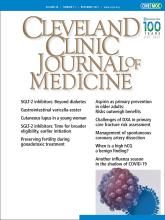
For years there has been discussion about the appropriateness of a glucocentric focus in the management of patients with diabetes. Studies demonstrated the benefit of glucose control on slowing some microvascular complications of diabetes, but the ability to ameliorate renal and particularly cardiovascular events, major causes of morbidity and mortality, has remained elusive. The concern that drugs designed to treat hyperglycemia might be detrimental to cardiovascular health prompted the US Food and Drug Administration to mandate that pharmaceutical sponsors monitor and document cardiovascular safety within their diabetes drug development programs.
A very positive and to me surprising result of this approach has been the robust demonstration of a cardioprotective effect of the sodium-glucose cotransporter 2 (SGLT-2) inhibitors, drugs that lower the blood glucose through decreased renal reabsorption of filtered glucose and sodium, independent of any effect on insulin levels or function.
In January of this year, we published 2 papers that included discussion of the role of SGLT-2 inhibitors in the treatment of diabetes and their renal benefits,1,2 and we recently posted on our website a video podcast, “Conversation With Leaders,” that focuses on the impact of SGLT-2 inhibitors in patients with chronic kidney disease (https://www.ccjm.org/page/conversations/ckd).
In this issue of the Journal, Drs. Ferro, Pitt, and Bhatt3 offer their perspective on the incorporation of SGLT-2 inhibitors into the routine medication cocktail for patients with heart failure. Large studies in patients with heart failure with reduced ejection fraction demonstrated efficacy of these drugs (seemingly as a class effect) in reducing mortality and hospitalizations due to heart failure. Recent studies, commented on by Drazner,4 note that SGLT-2 inhibitors are also efficacious in reducing heart failure-related hospital admissions in patients with heart failure with mildly reduced and even preserved ejection fraction—a seminal finding in patients with this syndrome.
Several intriguing preliminary generalizations arise from a review of these studies. The renal, heart failure, and cardiovascular mortality advantages attributed to SGLT-2 inhibitors appear to be independent of the presence of diabetes or changes in the hemoglobin A1c level. The heart failure benefit seems to be independent of the effect on renal disease, and in patients with preserved ejection fraction the benefit seems to be in reduced heart failure admissions, but not reduced mortality. The differences between the various SGLT-2 inhibitors will best be sorted out by head-to-head comparison studies. But as the history of new drug development has shown us, this is not likely to happen soon.
SGLT-2 inhibitor therapy is not without risks. The risk of genital mycotic infections, which may be severe, is increased but can be ameliorated to a degree by careful hygiene. Dehydration can occur due to urinary sodium and water loss, and the ordinarily uncommon syndrome of euglycemic ketoacidosis can occur due to decreased insulin levels of the diabetic state in the setting of systemic stress, with increased glucagon levels and fatty acid oxidation, while the glucose levels remain low due to glucosuria induced by SGLT-2 inhibition. However, these all seem to be manageable issues.
As Ferro and colleagues note in this issue, incorporation of SGLT-2 inhibitors into routine practice has been slow. The reasons are not fully defined, but a number of factors are likely at play, such as reduced patient visits for routine care in the time of COVID-19. Another factor could be an increased distrust of new medications and new medical information as fallout of the vaccine dialogues, and I have heard this in my clinic. There are also the usual concerns of unknown and known side effects, polypharmacy, and cost.
But despite these concerns, the rapidly growing amount of large-scale clinical outcome data and an improved understanding of the biologic effects of these drugs5 will hopefully provide sufficient comfort in the safe use of SGLT-2 inhibitors and thus change the expectations for the clinical course of our patients with diabetes, as well as those with chronic kidney disease and heart failure resulting from other etiologies.
- Copyright © 2021 The Cleveland Clinic Foundation. All Rights Reserved.






